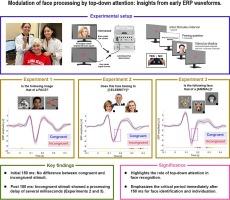Modulation of face processing by top-down attention: Insights from early ERP waveforms
IF 2.7
4区 医学
Q3 NEUROSCIENCES
引用次数: 0
Abstract
The face fusiform area (FFA) plays a pivotal role in face recognition, yet the precise timeline of its activity remains debated. Using EEG, we conducted three experiments to investigate how expectancy-consistent versus expectancy-inconsistent visual stimuli influence processing dynamics. Participants viewed images of faces, houses, and tools (Experiment 1), celebrity faces (Experiment 2), or animal faces (Experiment 3), preceded by a priming question. Notably, both conditions presented identical visual stimulation, ensuring that observed differences stemmed from cognitive processing rather than sensory input. Our results from Experiments 2 and 3 reveal that while the initial 150 ms period, crucial for unconscious face detection, remained unaffected, subsequent processing exhibited a delay of several milliseconds for expectancy-inconsistent stimuli, indicating additional processing time required for unexpected recognition. Importantly, no significant differences were observed in Experiment 1, where less demanding tasks or generic mental imagery were used, suggesting that the priming effect was not as pronounced in this context. These findings underscore the critical role of the period immediately following the first 150 ms in face identification and individuation, highlighting the influence of top-down attention on face recognition dynamics. This study provides novel insights into the temporal dynamics of face processing and the neural mechanisms underlying top-down attentional modulation.

自上而下的注意力对人脸处理的调节:早期 ERP 波形的启示。
人脸纺锤区(FFA)在人脸识别中起着举足轻重的作用,但其活动的精确时间线仍存在争议。通过脑电图,我们进行了三项实验来研究期望一致与期望不一致的视觉刺激如何影响处理动态。受试者在观看人脸、房屋和工具的图像(实验 1)、名人的图像(实验 2)或动物的图像(实验 3)时,会先听到一个引申问题。值得注意的是,这两种情况都呈现了相同的视觉刺激,从而确保观察到的差异源于认知处理而非感官输入。实验 2 和实验 3 的结果表明,虽然对无意识人脸识别至关重要的最初 150 毫秒时间段未受影响,但对于预期不一致的刺激,后续处理却表现出几毫秒的延迟,这表明意外识别需要额外的处理时间。重要的是,在使用要求较低的任务或一般心理想象的实验 1 中没有观察到显著差异,这表明在这种情况下引物效应并不明显。这些发现强调了紧随第一个 150 毫秒之后的时间段在人脸识别和个体化中的关键作用,突出了自上而下的注意力对人脸识别动态的影响。这项研究为人脸加工的时间动态和自上而下注意调节的神经机制提供了新的见解。
本文章由计算机程序翻译,如有差异,请以英文原文为准。
求助全文
约1分钟内获得全文
求助全文
来源期刊

Brain Research
医学-神经科学
CiteScore
5.90
自引率
3.40%
发文量
268
审稿时长
47 days
期刊介绍:
An international multidisciplinary journal devoted to fundamental research in the brain sciences.
Brain Research publishes papers reporting interdisciplinary investigations of nervous system structure and function that are of general interest to the international community of neuroscientists. As is evident from the journals name, its scope is broad, ranging from cellular and molecular studies through systems neuroscience, cognition and disease. Invited reviews are also published; suggestions for and inquiries about potential reviews are welcomed.
With the appearance of the final issue of the 2011 subscription, Vol. 67/1-2 (24 June 2011), Brain Research Reviews has ceased publication as a distinct journal separate from Brain Research. Review articles accepted for Brain Research are now published in that journal.
 求助内容:
求助内容: 应助结果提醒方式:
应助结果提醒方式:


